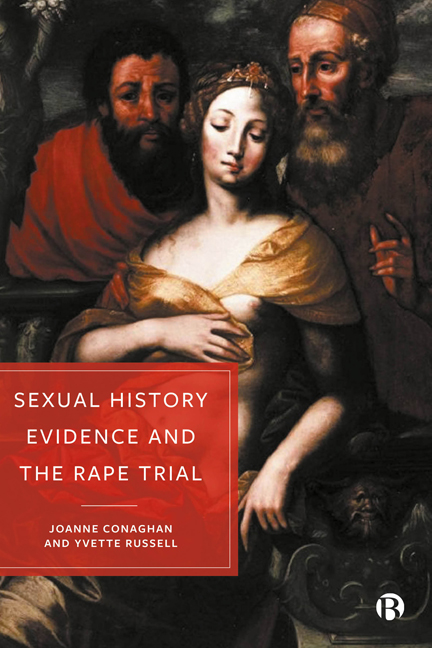Book contents
- Frontmatter
- Contents
- List of Cases
- List of Statutes
- About the Authors
- Acknowledgements
- 1 Introduction: Setting the Scene
- 2 A History of Rape Law in Action
- 3 Emergence of a Legal Regime Governing the Use of Sexual History Evidence
- 4 Legal Regulation: Limits and Potentialities
- 5 Tracking the Use of Sexual History Evidence in the Courtroom
- 6 The Relevance of Sexual History Evidence
- 7 Sexual History Evidence and Subjectivity
- 8 Conclusion: What Is to Be Done about Sexual History Evidence?
- References
- Index
2 - A History of Rape Law in Action
Published online by Cambridge University Press: 03 April 2024
- Frontmatter
- Contents
- List of Cases
- List of Statutes
- About the Authors
- Acknowledgements
- 1 Introduction: Setting the Scene
- 2 A History of Rape Law in Action
- 3 Emergence of a Legal Regime Governing the Use of Sexual History Evidence
- 4 Legal Regulation: Limits and Potentialities
- 5 Tracking the Use of Sexual History Evidence in the Courtroom
- 6 The Relevance of Sexual History Evidence
- 7 Sexual History Evidence and Subjectivity
- 8 Conclusion: What Is to Be Done about Sexual History Evidence?
- References
- Index
Summary
Why history?
The 18th-century jurist William Blackstone famously said: ‘It is better that ten guilty persons escape than one innocent suffer’ (Blackstone, 1803, IV.27). This is just one example of how the contemporary criminal trial is expressive of value judgements which, while made long ago, have since assumed the status of fundamental principles in modern criminal justice. Few criminal law scholars would deny that their territory is deeply normatively imbued. Indeed, much criminal law scholarship today is preoccupied with normative enquiry into the moral rationales for criminalising individual acts (Wertheimer, 2003; Duff, 2018; Green, 2020).
From where does the normative content of criminal law come, and how does it acquire weight and validity? This is first and foremost a historical question. As Alan Norrie argues, the normative contours of contemporary criminal law were ‘formed in a particular historical epoch [which Norrie identifies with 18th-century Enlightenment thought] and derived their characteristic shape from fundamental features of the social relations of that epoch’ (Norrie, 2014: 10). Lacey too emphasises the historical dimensions of criminal law, showing how conceptions of the criminal subject have varied over time and space so that ascriptions of criminal responsibility are best understood, not abstractly but contextually, in relation to ‘broader social, cultural, political and economic developments’ (Lacey, 2016: vii). By historicising and contextualising criminal law, Norrie and Lacey highlight the specificity of the ideas and perceptions of human relations which underpin modern criminal justice. Importantly, their work reveals not only that criminal law is normatively imbued, but also that the terms of normative engagement are historically derived, governed by conceptions of human nature, social relations and the role, functions and legitimacy of the state, which are now so well embedded in the criminal justice infrastructure as to appear beyond contest. ‘At the core of the philosophy behind criminal law’, Norrie comments, ‘is a moral individualism which proclaims that for the state to intervene against the individual, it must have a good and clear licence to do so’ (Norrie, 2014: 13). Both Norrie and Lacey set out to represent the liberal individualism of criminal law – the unchallenged and essentially unchallengeable foundation of the criminal justice edifice – as a social and historical construct which derives its weight and validity from the ‘ideas, interests and institutions’ (Lacey, 2016) that shaped its formation and development.
- Type
- Chapter
- Information
- Sexual History Evidence and the Rape Trial , pp. 18 - 38Publisher: Bristol University PressPrint publication year: 2023



